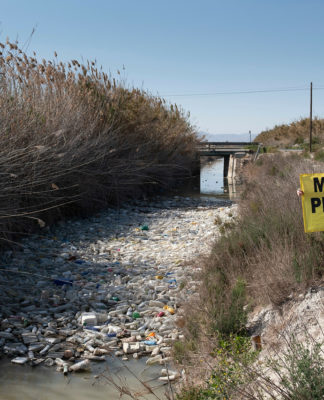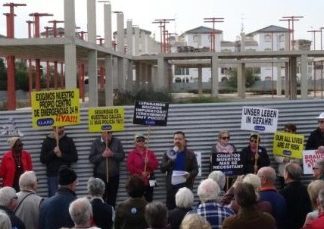Email
July 24
Dear Editor,
I refer to the Letters page of your July 19-25 edition. Since the majority of the writers refer to the matter of Crown pensions and your continued interest in this matter through Dave Jones, I should like to make a few observations.
Dealing with the first letter above ‘name withheld’, but who announces himself as a former member of the Fire Service.
In essence, the writer refers to his Crown pension as being taxed both in the UK and in Spain. This is not exactly the case, but it is rather a case where, in effect he has had his UK allowances, which had been set against his pension in the UK, with his entire pension being joined with other taxable income such as his state old-age pension being subjected solely to Spain’s autonomous regions’ income tax systems with their allowances set against his entire income with a deduction of the tax already paid in the UK.
In short, he is being taxed in the same manner as a Spanish income tax payer.
Double Taxation Conventions are based on the OECD Model, which are essentially of a bi-lateral nature between two Member States. Even here, there is flexibility as to the application of the OECD Models, with Member States reserving the right to take a different approach to that set out in the Model. These variations can be found in the Commentaries to the articles of the OECD Model. In its current edition the Model, with its commentaries, is comprised of some 658 pages and does take some reading, especially where if one is to get the whole picture it does mean going back to the many earlier Commentaries, as I have done.
It is not my intention here to go into the finer details of this vexatious matter, but merely to give some guidance to readers, especially to those who have posed certain questions.
The contentious issue that arises here is where Crown pensions have always stood alone in the various Conventions, as a special kind of pension and it was also the case in the former Conventions between the UK and Spain, where currently they are addressed by Article 18 (ex-Article 19 of the former Convention).
Pensions, contributory or otherwise, awarded for services rendered to a government or local authority or a political sub-division ‘shall’ be taxed in the awarding state. In the current OECD Model they are addressed at its Article 19. This also distinguishes them from income which ‘may’ be taxed in the awarding state. This distinction can be drawn from the relevant wording of both the OECD Model and the current Convention UK/Spain, since with regard to the former the expression shall be taxed in the awarding/paying state gives the exclusive right of taxation to that State.
This interpretation can be found in the OECD Commentary where it is expressed in most clear terms and since these Conventions have continuously developed since 1958, albeit the OECD model was not actually published until 1977. In the meantime, the Vienna Convention on the Law on Treaties 1969 entered the arena. Most importantly, the Conventions were based on the principle of ‘reciprocity’. An expression that is the very corner stone of these Conventions and is repeatedly referred to, not only in the current OECD Model, but also in the much earlier Models.
The OECD Models were primarily framed in order to conform with the rules of international courtesy and mutual respect between sovereign States. In the OECD draft of 1963, the expression ‘may be taxed’ was used and this did not connote an exclusive right of taxation. Hence, the expression ‘shall be taxed’ was introduced into Article 19 of the OECD Model (Article 18 of the current UK/Spain Convention).
The question as to whether Spain is currently violating Article 18 of the Convention is a matter of opinion based on the interpretation of the wording of the Convention, which should be read inter alia. I and several lawyers I have consulted, namely Raymundo & Lundkvist, formerly Raymundo & Hopman, Alicante, agree my reasoned opinion to the effect that Spain is acting in violation of Article 24 (1) of the Convention, which addresses the matter of discrimination, as we shall shortly see. It is also true to say that other lawyers disagree. I dismiss those who operate as tax advisers etc., as they will rarely be active lawyers and tend to go with the flow rather than to question. Which is a common failing here in Spain. This is what Article 24 of the current Convention has to say;
Article 24 NON-DISCRIMINATION.
Sets out:
1. Nationals of a Contracting State shall not be subjected in the other Contracting State to any taxation or any requirement connected therewith, which is other or more burdensome than the taxation and connected requirements to which nationals of that other State in the same circumstances, in particular with respect to residence, are or may be subjected.
When looking closely at Article 24 (1) it is a question of the correct interpretation of the wording, ‘any requirement connected therewith, which is other or more burdensome than the taxation and connected requirements to which nationals of that other State in the same circumstances, in particular with respect to residence’. I and others take the view that, ‘In the same circumstances… with respect to residence’, to mean the manner and way a Spanish national is treated for tax purposes where he is in receipt of a Crown pension from Spain and resident in the UK. Whereas others take the view that the expression same circumstances refers to being treated differently from a Spanish national where both are resident in Spain. That view gives absolutely no sense to the question to be considered.
This brings me to the letter from the writer who signs off, Jim, where in effect, he asks as to whether a Spanish national, who is in receipt of a Crown pension and resides in the UK, has that pension taken into consideration by HMRC when considering taxation on other income? I can tell him that following a FOI request HMRC do not take such pensions into consideration, albeit they do require knowledge of them. This then begs an answer to the question as to ’Why not?’ Is it perhaps because they know that the Convention precludes this. After all HMRC have never had the reputation of being some benevolent society.
Another matter, which must also be considered, is why the OECD Model on Conventions devotes so much time and energy to Crown pensions, particularly when giving the exclusive taxation rights to the awarding state. In his letter, Jim quite correctly states that an NHS pension is not regarded as a Crown pension. However, he also refers to where a Crown pension is a non-contributory pension. I have to tell him, not so, because the determining fact is that the pension awarded is for services rendered and some are contributory, such as the police service, and others are not. Jim raises other issues, which I shall not go into.
This letter is then followed by another, ‘Name withheld’ and is addressed to CBN journalist Dave Jones. The writer declares himself to be a victim of ‘Spain’s tax grab’ and other than setting out that he has been fined for late payment, he asks as to whether there is any other group in Spain fighting this matter.
Sadly, I have to tell him there is not. The reality of the situation was that I had offered my services, including putting myself forward as a pilot case, after having meetings with a law firm in Alicante. I am advised by this firm that a ‘class action’ cannot be considered due to the fact that no two person’s circumstances will be the same. However, in view of the fact that it would have meant funding such an action before the Courts, even though Spain’s Supreme Court have recently ruled that, in litigation in matters involving taxation, there should be no Court fees. Of course, that ruling does not apply to lawyers’ fees and expenses, which make up the main proportion of expenses involved. This newspaper had been most helpful when forwarding me names and contact details of those with an interest in this matter, but the bottom line was that their first question was always how much would it cost?
In the final event there were only a handful prepared to offer even a reasonable contribution towards the cost of taken this matter forward with the Courts in mind. Further, I could give no guarantee that such an action would succeed. Therefore, I was unable to take the matter forward. It is most unfortunate that the overwhelming majority of expats are quite happy to allow others to work on their behalf, but want everything in return for free.
My dealings with HMRC in this matter reveal that one cannot place reliance on their responses. For example back in early 2000, I was approached by a former Treasury Inspector at a time when Spain was attempting to apply its income tax rules in respect of Crown pensions. I followed the diplomatic route and the response through our embassy from HMRC London was, ‘Mr. Burrage is correct, Spain cannot take Crown pensions into consideration and further, that he would speak with his opposite number in Madrid.’ This was at a time when The Double Taxation Relief (Taxes on income) (Spain) Order 1976 was in force. Despite this, in a response to me following the current Convention entering into force in 2014, HMRC advised me that Spain always had had the right to take Crown pensions into consideration for taxation purposes.
I should further add that several years ago I was approached by the late Brian Cave, an expat resident in France, because the French Income Tax Authorities were then taking such pensions into account when assessing the recipients liability in respect of other income.
In a letter to him from HMRC (Fwd. to me), Mr Cave, having advised HMRC that I had brought the practice to an end in Spain, HMRC stated that the Convention the UK had with France was different from the one they had with Spain. This was completely false because the wording of each of those Conventions was identical to the last comma. Hence, I am not in the least surprised over the negative responses readers have reportedly experienced at the hands of HMRC.
I now turn to the letter by David Crossan BEM. The purport of which is where after 18 years in the Royal Air Force he was awarded an invalidity pension for which he says he must report for income tax purposes in Spain. I would need to learn more about his pension, because his pension should show which part of it makes up the invalidity component which is tax free in the UK and if that is the case he should not have declared it here in Spain.
This brings me to the letter from Wilfred Weissmann wherein he offers his own advice in this matter of Double Taxation when launching into the Treaty (TFEU) and offering up not specifically related case law of the CJEU and where he suggests the route to follow would be to address this matter as a breach of Community law and to bring the matter before the CJEU.
He cites where that Court ruled discrimination in the matter of the discrepancy in Capital Gains Tax between residents and non-residents. Of course, that was clearly a case of non-permitted discrimination, although I am not privy to any prior action first taken at domestic level. He also talks about a referral to the EU Ombudsman. I have to tell Mr Weissmann, albeit I know he will protest, that such matters must first be addressed at national level and that it is only where the matter cannot be resolved that there may be an opportunity to address the matter at Community level and even then there is a correct route to follow.
However, with regard to this present matter there is a specific route which must be followed when seeking to resolve disputes related to matters covered by the Convention an resorting to the EU can only be the last resort and even then only in respect of breaches of Community law. Below I only set out its first paragraph, but needless to say, this is the lengthiest Article of the Convention.
Article 25 MUTUAL AGREEMENT PROCEDURE
1. Where a person considers that the actions of one or both of the Contracting States result or will result for him in taxation not in accordance with the provisions of this Convention, he may, irrespective of the remedies provided by the domestic law of those States, present his case to the competent authority of the Contracting State of which he is a resident or, if his case comes under paragraph 1 of Article 24, to that of the Contracting State of which he is a national. The case must be presented within three years from the first notification of the action resulting in taxation not in accordance with the provisions of the Convention.
Paragraph 1 of Article 24 of the Convention is set out above.
Finally, I turn to the letter headed ‘Mixed pensions aged couple’s rules’ from Ms. Dorothy Stansfield in response to a letter from William Beaumont published in the previous edition of the CBN, wherein Ms Stansfield refers to Mr Beaumont getting his facts wrong.
Whilst it is not my role to act as an arbitrator, although I recalled reading Mr Beaumont’s letter, in order for me to properly deal with the exchanges in this matter, which went beyond the subject matter quoted by Ms. Stansfield, I contacted Mr.Beaumont, who had previously sought my advice in another matter and requested he send me a copy of his letter.
Firstly, Mr Beaumont had quite correctly reported that the Adult Dependency Increase, being an allowance hitherto awarded to a person in receipt of their state old-age pension where their spouse/partner is below pension age will be withdrawn from all as of April 5, 2019 and letters are currently being sent out by the DWP so advising all those in receipt of this allowance.
This will bring more expats to below the poverty line because, this benefit is worth £70 a week, or put another way £280 in a 4 week month. Mr Beaumont being one of those pensioners so affected. Therefore, not unnaturally he is extremely concerned. Unfortunately those expats so affected and unlike pensioners resident in the UK they cannot claim such other benefits as the winter payment, housing benefit or pension credit.
Further, whilst it may be said Mr Beaumont did lose his way, so did Ms. Stansfield even though she correctly identified the changes which took effect as of 15 May last as not affecting the payment of the state old-age pension Ms Stansfield wrongly criticised the CBN for publishing his letter, whereas Ms. Stansfield had also failed to explain the importance of the fact these changes essentially affect on UK residents.
Ms. Stansfield also quite wrongly refers to the state old-age pension as being an entitlement. That is not the case other than where the right is enshrined in an international treaty, such as membership of the EU in accordance with Regulation EC/883/04 and that right may be lost unless there is a Brexit deal.
Indeed, there are only a handful of countries worldwide with whom the UK has an agreement, one being the USA but regrettably not with any of the Commonwealth countries. Hence the fact that the UK is able to freeze the pensions of those where no treaty exists. For the record the last ruling as to there being no actual entitlement to receive a state old-age pension was by the House of Lords (Now our Supreme Court) on 26 May 2005 in Regina v. Secretary of State for Work and Pensions ex parte Carson & Reynolds.
David Burrage








































